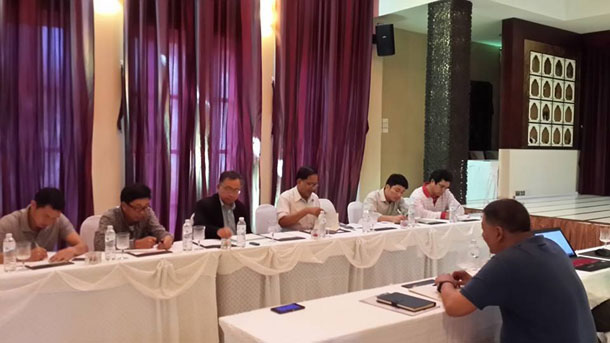CHIANG MAI, Thailand — Representatives of the Nationwide Ceasefire Coordination Team (NCCT) have told officials from the government-affiliated Myanmar Peace Center (MPC) that they want the peace process to move forward despite last week’s deadly attack by the Burma Army on a Kachin rebel base.
During a two-day meeting in Chiang Mai in northern Thailand this week, the NCCT, a working group representing 16 ethnic armed groups in ceasefire talks with the government, told MPC members that the shelling of the Kachin Independence Army (KIA) base in Laiza had hampered ongoing peace negotiations.
Twenty-three cadets from other ethnic armed groups allied with the KIA who were training at the base were killed in the attack.
Since the shelling, described by Burma Army Commander-in-Chief Min Aung Hlaing as “warning shots” in response to an alleged earlier attack, tensions have continued to escalate. Over the weekend, the army fired more than a dozen mortar rounds close to KIA positions and camps for internally displaced persons.
“We told them [MPC members] that the attack [on Laiza] was not appropriate. It could slow down the peace process. But we don’t want the peacemaking program to come to a total breakdown,” said Nai Hong Sar, the chairman of the NCCT, who attended the Nov. 24-25 meeting.
The two sides also discussed the draft text of a nationwide ceasefire agreement as well as military and security affairs.
“We talked about obstacles on the path of the peace process, especially military and security issues such as troop positions, the issue of a federal army and political dialogue,” Nai Hong Sar said.
The NCCT chairman said that issues concerning disarmament, demobilization and reintegration that that have been pushed by the Burma Army were also included in the discussion. The NCCT has broadly rejected the Army’s demands that ethnic armed groups disarm.
No firm agreements were reached as the discussion was informal and the MPC members didn’t officially represent the government’s peace negotiation team, the Union Peace-making Work Committee (UPWC), according to Nai Hong Sar.
Other NCCT leaders including Kwe Htoo Win, who is general secretary of the Karen National Union, and KIA representatives were present at the meeting. Gen. Gun Maw, the KIA’s vice chief of staff, who is also a NCCT leader, did not attend the meeting as he was busy with internal deliberations concerning the Burma Army’s recent attacks. Min Zaw Oo and Nyo Ohn Myint attended the meeting on behalf of the MPC.
Since the NCCT’s last meeting with UPWC and Army officials in Rangoon in September, some observers have voiced concerns that national ceasefire talks have stalled. A statement released by a group of civil society representatives on Monday following a meeting with the NCCT noted that the military’s “uncompromising” position in negotiations had led to a “deadlock” over the language used in the most recent draft of a ceasefire agreement.
Disagreements have reportedly centered on the use of the words “federalism” and “revolution” in the draft agreement. During previous meetings, the UPWC had reached an agreement with the NCCT about the terminology, but it was roundly rejected by the military.
More than a dozen ethnic armed groups have signed bilateral ceasefires with the government since President Thein Sein took office in 2011. The KIA and the Ta’ang National Liberation Army have yet to do so and have frequently clashed with government troops in recent months.

















